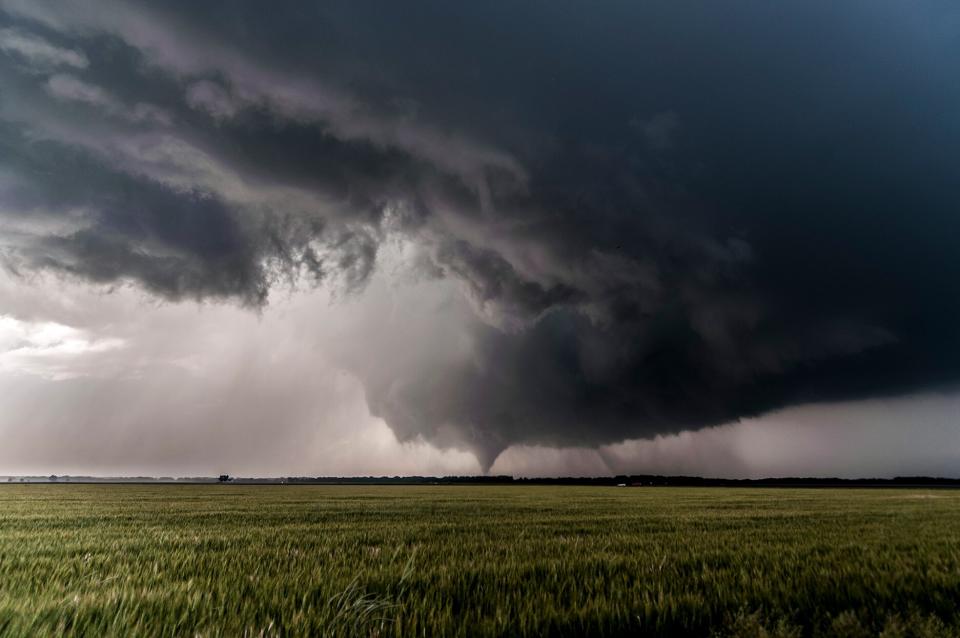8 Must-Know Tips to Help You Prepare for a Tornado
No, tornadoes aren’t just in Kansas. Most of the world’s tornadoes occur in America across the Midwest and South, making the unexpected twisters a reality worth preparing for. During the high season, May and June, families should remain vigilant for unpredictable tornadoes and watch for Mother Nature’s warning signs. To prepare for these potential natural disasters, make sure your family has a designated shelter, keeps safety kits in essential locations, and is familiar with an emergency communication plan. Use these tornado safety tips to ensure your family (including pets) are taken care of in the event of an emergency.

Graham Moore/Getty Images
1. Know the Key Tornado Warning Signs
Although tornadoes do strike quickly, they are often preceded by specific warning signs. Watch for dark clouds that give the sky a green tint, heavy rain, humidity, and blowing winds. The National Severe Storms Laboratory says tornadoes can happen at any time of day but are most common between 4 and 9 p.m. Keep an eye on weather alerts too. Tornado watches are issued when weather conditions could cause a tornado; a tornado warning occurs when a tornado is likely or imminent in your area. Know your community’s various outdoor warning systems—whether siren, radio signal, or text message alert.
Related: How to Prepare for a Hurricane
2. Designate a Tornado Shelter or Safe Room
Most families choose the basement or a windowless room on the lowest floor as their tornado shelter because it provides safety from dangerous winds and debris. Keep non-perishable food, bottled water, and emergency medications stored in the same safe location to save valuable time during an emergency. You’ll want to keep a battery-powered weather radio in the shelter, such as the FosPower Emergency Solar Hand Crank Portable Radio ($30, Amazon), so authorities can let you know when it’s safe to come out. Periodically check to ensure the radio works (you can never be too careful) and that any medications have not expired. When you hear tornado sirens, your family should go to the shelter to safely wait out the storm.
3. Create an At-Home Safety Kit with Tornado Essentials
In addition to designating a safe room stocked with necessary supplies, it’s a good idea to create a portable safety kit in case it is too dangerous to stay in your home. We recommend keeping basic first aid supplies in the kit, as well as flashlights, batteries, a portable self-powered radio, and an emergency signal light. A backup pair of clothes, underwear, and socks for everyone in the family could come in handy if you need to wait out the storm in public a shelter. If you don’t want to build one from scratch, check out the Deluxe Auto First Aid Kit ($21, American Red Cross) with on-the-go medical equipment and a travel blanket.
4. Keep a Tornado Kit in Your Car
You won't always be at home when a tornado strikes, so it’s important to have on-the-go supplies. Use a water-resistant toolbox to store water bottles, a first aid kit, a whistle, a battery-powered weather radio, disinfectant wipes, a small amount of cash, and granola bars in your vehicle. If you are in the car during a tornado, drive to a nearby shelter and bring the kit in with you. If you are stuck outdoors, only take shelter under a highway overpass or in a ditch at the last resort; the National Oceanic and Atmospheric Administration warns that people out in the open could be exposed to flying debris, dangerous winds, and hail.
Related: How To Make An Emergency Car Kit
5. Build a Cat and Dog Emergency Kit
If you have a pet, add a few items from our Dog and Cat First Aid Kit to your emergency bags, like a harness, leash, and extra towels. Keep extra food and water in your designated shelter location for your pet. A few toys can help keep them calm during tumultuous weather. If you’re feeling particularly inspired, our frozen, two-ingredient peanut butter dog treats are a fan-favorite for pooches.
6. Don’t Forget Important Documents
If the unthinkable occurs and a tornado damages your home, the last worry you need is finding property records or insurance policy numbers. FEMA recommends organizing important papers in a fireproof lockbox or safety deposit box that can survive severe weather or travel with you to a shelter. Include copies of birth certificates, citizenship documents, insurance policy numbers, deeds of trust, mortgage documents, rental agreements, and financial records.
7. Invest in a Portable Phone Charger
In a digitally-driven world, find yourself without a power source for your cell phone during a tornado scare would leave you feeling cut off. Consider investing in an emergency portable cell phone power bank like the compact Anker PowerCore ($25, Amazon). Keep it in your car or emergency kit with a power cord to ensure you’re always connected to emergency services and the latest weather updates.
8. Check Your Car and Home Insurance
Even if you are never in the danger zone of a tornado funnel, the wind and rain often bring storm damage. If you park a vehicle outside, it may be damaged by hail or debris. Your roof can also get impact marks and develop splits or leaks if untreated. Check to see what your home insurance and car insurance cover and how the claim process works. With a basic understanding, you will be better prepared to handle the crisis if it arises.
By taking these simple precautions, you can ensure the people closest to you are calm and taken care of when a tornado hits.

